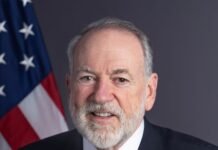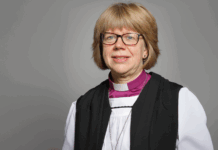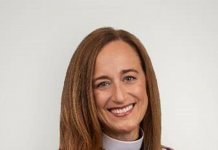The following is a transcript of the opening remarks of Presiding Bishop Michael Curry at the Executive Council of The Episcopal Church, meeting virtually through Jan. 27. These remarks have been lightly edited for clarity.
Executive Council
January 25, 2022
Opening Remarks
It is good to be together, I wish we were in Cleveland right now, I wish we were all together, but we will be together very soon.
I
Recently I was talking to a good friend who suggested that I needed to take a look at the reading from Nehemiah appointed for last Sunday (Nehemiah 8:1-10).
In the text, Ezra the priest reads the law of God to the people. And the text says that when he reads it and interprets it and applies it to their lives, the people wept when they heard it. Why did they weep? My friend was right. That’s simply extraordinary! God’s word was read, interpreted, and applied to their lives, and the people wept! Why in God’s name did they weep?
They had been through a long period of dislocation, disorientation, and disequilibrium. Worse than a pandemic, but related. Their world had actually fallen apart when the Babylonian armies razed the Judea countryside, breached the walls of Jerusalem, desecrated the Temple King Solomon had built, and virtually destroyed Jerusalem.
Many of the people were then carted off to Babylon, to virtual servitude, a long, long way from home. As the exile went on, they forgot what home was like. The temple of Jerusalem became a distant memory.
In time many probably forgot the faith that gave them birth. Holy days sometimes went unobserved. Teachings unlearned. Traditions left unkept. They did what they could to survive on what they had. The deep spiritual and emotional pain of this is captured in one of the psalms that they have left us, Psalm 137, which says:
“By the waters of Babylon—
we sat down and wept
and we remembered thee, O Zion,
when we remembered home.
On the willows
we hung up our harps.
For it was there that our captors
required of us a song,
tormenting us with the words,
‘Sing us one of the songs of Zion!’
But how, how shall we sing the LORD’s song
in a strange land?” (paraphrased)
And soon the very song was forgotten.
And then on that day years later in Jerusalem, Ezra read the Torah, God’s law for life; he interpreted it and applied it to them. And they remembered!
They remembered their high calling.
They remembered life that is more than mere survival.
They remembered who they were and whose they were.
The congruence of their lives with their calling, their highest and noblest aspirations, ideals gave them something exile had taken away—a deep sense of a divine purpose for living.
In God‘s law they discovered who they were. And when you know that you can face anything, you can endure anything, you can bear any burden, with a sense of direction no matter how hard life can be.
Another way to say it is they found their soul, their core, the essence, their heart. And when that happens the word of Ezra in the rest of the text becomes true –
“Go your way,” he said to them, “eat the fat and drink sweet wine and send portions of them to those for whom nothing is prepared, for this day is holy to our LORD; and do not be grieved, for the joy of the LORD is your strength.”
II
In 2005 Huston Smith, who was himself a Christian, grown up the son of Methodist missionaries in Asia but who was a scholar of world religions, wrote one of his last books. In it he spoke of the renewal of genuine Christianity in our time in a process similar to that described when Ezra read the law. Part of what he said in that book was that Christianity would be revived, renewed, and restored as it rediscovers and reclaims its soul, its origin, its essence, found in the teachings, and the life and the spirit of Jesus of Nazareth. He called his book “The Soul of Christianity: Restoring the Great Tradition.”
The wisdom here is one of the reasons I believe passionately that we in our time must reclaim the teachings, and the example, and the spirit of Jesus of Nazareth and his way of love as our way of life.
Some years later, after Huston Smith had published his book, historian Jon Meacham followed a similar trajectory to Huston Smith and to Ezra—now for American democracy and society, to reclaim the high calling and noble ideals, in a book titled, interestingly enough, “The Soul of America: The Battle for Our Better Angels.”
To find our way as a nation that is more than a collection of individual self-interest, it will be necessary for us to claim the high calling of the ideals and principles at the core, the soul of the American experiment in representational democracy.
III
Those ideals are found in such texts as the Declaration of Independence, Lincoln’s Gettysburg Address, King’s “Letter from a Birmingham Jail.” They are found, though imperfect it may be, in the Constitution of the United States, the Bill of Rights and subsequent amendments. But listen again to the words of the Preamble:
“We the People of the United States, in Order to form a more perfect Union, establish Justice, insure domestic Tranquility, provide for the common defense, promote the general Welfare, and secure the Blessings of Liberty to ourselves and our Posterity, do ordain and establish this Constitution for the United States of America.”
The ideal of democracy, while not perfectly lived out to be sure, offers the best hope yet devised for government that fosters human freedom, equal justice under law, the dignity and equality of every human being made as the Bible says in the image and likeness of God.
A cornerstone of that democratic ideal is and remains the right to vote. The right to vote is a fundamental human right grounded in the dignity and equality of human beings. I am thankful that this Executive Council previously has gone on record supporting, or advocating for the John R. Lewis Voting Rights Advancement Act, the Freedom to Vote Act, and/or other similar legislation that enhances and furthers the provisions and intention of the Voting Rights Acts of 1965.
But as you know from the news, this is not going to happen overnight, and it’s not going to happen easily. But we and other people of good will must work, we must persist, and we must labor on against the odds until the right to vote is fully protected and unencumbered by partisan self interest.
Like the story of the persistent widow that Jesus told, who would not let the judge get away with ignoring her, we must persist until justice rolls down like a mighty stream and righteousness like an ever-flowing brook.
But we must do something else. We must both advocate for these legislative remedies and also roll up our sleeves to do the hard and laborious work of nonpartisan—and please hear me when I say this; don’t anybody send me emails saying this is partisan since this is not a partisan rant—we must do the hard and laborious work of nonpartisan voter education, registration, and facilitation. And it’s hard work. And you wonder why is he saying this now? It’s January—the midterms aren’t till November. We can’t wait until November to start that work! We must start now.
The Office of Government Relations has begun an effort to do just that. It’s called Episcopal Activators. This is a practical effort to help people to vote in spite of encumbrances that may currently stand in the way for many in many of our states. We must help folks be able to cast an unencumbered ballot. We must do so in a nonpartisan way, but we must do it.
The right to vote is not merely a secular ideal. It is a fundamental human right grounded in the innate dignity and equality of every human being created, as the Bible says, in the image and likeness of God.
For this reason the passage of the foundational Voting Rights Bill of 1965 only occurred after long, protracted nonviolent struggle and protest.
It is salutary to remember that countless people were beaten and hospitalized on the successive marches in Selma. It is important to remember that on that March “Bloody Sunday,” 17 marchers were hospitalized by beatings from law enforcement. Several dozen were treated in hospitals and released.
And maybe it is most important to remember that in the Selma struggle for voting rights, four nonviolent protesters and children of God involved in voter registration were killed:
Jimmie Lee Jackson, a local Baptist deacon. The Rev. James Reeb, a Unitarian minister. Viola Liuzzo, a housewife who volunteered from Detroit. And Jonathan Myrick Daniels, an Episcopal seminarian.
They gave their lives for the right to vote. But they were martyrs who gave their lives for the cause of our God-given human right and dignity. “We hold these truths to be self-evident, that all men are created equal. That they are endowed—not by a parliament, not by a government—endowed by their Creator with certain unalienable rights.” That is not simply a secular ideal, that is an ideal born of the God who made all human beings equally imago dei, in the image of God. And we who are followers of Jesus Christ, we who are citizens of this country, we who are people of good will and human decency of any stripe or type, must not, cannot, and we will not allow their sacrifice to be in vain.
Amen.



